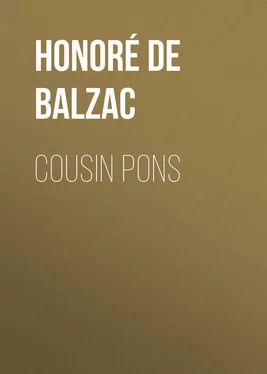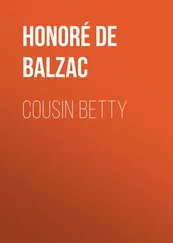Honoré Balzac - Cousin Pons
Здесь есть возможность читать онлайн «Honoré Balzac - Cousin Pons» — ознакомительный отрывок электронной книги совершенно бесплатно, а после прочтения отрывка купить полную версию. В некоторых случаях можно слушать аудио, скачать через торрент в формате fb2 и присутствует краткое содержание. Жанр: literature_19, foreign_antique, foreign_prose, на английском языке. Описание произведения, (предисловие) а так же отзывы посетителей доступны на портале библиотеки ЛибКат.
- Название:Cousin Pons
- Автор:
- Жанр:
- Год:неизвестен
- ISBN:нет данных
- Рейтинг книги:3 / 5. Голосов: 1
-
Избранное:Добавить в избранное
- Отзывы:
-
Ваша оценка:
- 60
- 1
- 2
- 3
- 4
- 5
Cousin Pons: краткое содержание, описание и аннотация
Предлагаем к чтению аннотацию, описание, краткое содержание или предисловие (зависит от того, что написал сам автор книги «Cousin Pons»). Если вы не нашли необходимую информацию о книге — напишите в комментариях, мы постараемся отыскать её.
Cousin Pons — читать онлайн ознакомительный отрывок
Ниже представлен текст книги, разбитый по страницам. Система сохранения места последней прочитанной страницы, позволяет с удобством читать онлайн бесплатно книгу «Cousin Pons», без необходимости каждый раз заново искать на чём Вы остановились. Поставьте закладку, и сможете в любой момент перейти на страницу, на которой закончили чтение.
Интервал:
Закладка:
“You look sad ven you look at your friend,” remarked Schmucke, who had listened with great interest. “Kann you pe chealous of him?”
“I am jealous for Fritz’s happiness,” said Wilhelm. “Does that face look as if it belonged to a happy man? I am afraid of Paris; I should like to see him do as I am doing. The old tempter may awake again. Of our two heads, his carries the less ballast. His dress, and the opera-glass and the rest of it make me anxious. He keeps looking at the lorettes in the house. Oh! if you only knew how hard it is to marry Fritz. He has a horror of ‘going a-courting,’ as you say; you would have to give him a drop into a family, just as in England they give a man a drop into the next world.”
During the uproar that usually marks the end of a first night, the flute delivered his invitation to the conductor. Pons accepted gleefully; and, for the first time in three months, Schmucke saw a smile on his friend’s face. They went back to the Rue de Normandie in perfect silence; that sudden flash of joy had thrown a light on the extent of the disease which was consuming Pons. Oh, that a man so truly noble, so disinterested, so great in feeling, should have such a weakness!.. This was the thought that struck the stoic Schmucke dumb with amazement. He grew woefully sad, for he began to see that there was no help for it; he must even renounce the pleasure of seeing “his goot Bons” opposite him at the dinner-table, for the sake of Pons’ welfare; and he did not know whether he could give him up; the mere thought of it drove him distracted.
Meantime, Pons’ proud silence and withdrawal to the Mons Aventinus of the Rue de Normandie had, as might be expected, impressed the Presidente, not that she troubled herself much about her parasite, now that she was freed from him. She thought, with her charming daughter, that Cousin Pons had seen through her little “Lili’s” joke. But it was otherwise with her husband the President.
Camusot de Marville, a short and stout man, grown solemn since his promotion at the Court, admired Cicero, preferred the Opera-Comique to the Italiens, compared the actors one with another, and followed the multitude step by step. He used to recite all the articles in the Ministerialist journals, as if he were saying something original, and in giving his opinion at the Council Board he paraphrased the remarks of the previous speaker. His leading characteristics were sufficiently well known; his position compelled him to take everything seriously; and he was particularly tenacious of family ties.
Like most men who are ruled by their wives, the President asserted his independence in trifles, in which his wife was very careful not to thwart him. For a month he was satisfied with the Presidente’s commonplace explanations of Pons’ disappearance; but at last it struck him as singular that the old musician, a friend of forty years’ standing, should first make them so valuable a present as a fan that belonged to Mme. de Pompadour, and then immediately discontinue his visits. Count Popinot had pronounced the trinket a masterpiece; when its owner went to Court, the fan had been passed from hand to hand, and her vanity was not a little gratified by the compliments it received; others had dwelt on the beauties of the ten ivory sticks, each one covered with delicate carving, the like of which had never been seen. A Russian lady (Russian ladies are apt to forget that they are not in Russia) had offered her six thousand francs for the marvel one day at Count Popinot’s house, and smiled to see it in such hands. Truth to tell, it was a fan for a Duchess.
“It cannot be denied that poor Cousin Pons understands rubbish of that sort – ” said Cecile, the day after the bid.
“Rubbish!” cried her parent. “Why, Government is just about to buy the late M. le Conseiller Dusommerard’s collection for three hundred thousand francs; and the State and the Municipality of Paris between them are spending nearly a million francs over the purchase and repair of the Hotel de Cluny to house the ‘rubbish,’ as you call it. – Such ‘rubbish,’ dear child,” he resumed, “is frequently all that remains of vanished civilizations. An Etruscan jar, and a necklace, which sometimes fetch forty and fifty thousand francs, is ‘rubbish’ which reveals the perfection of art at the time of the siege of Troy, proving that the Etruscans were Trojan refugees in Italy.”
This was the President’s cumbrous way of joking; the short, fat man was heavily ironical with his wife and daughter.
“The combination of various kinds of knowledge required to understand such ‘rubbish,’ Cecile,” he resumed, “is a science in itself, called archaeology. Archaeology comprehends architecture, sculpture, painting, goldsmiths’ work, ceramics, cabinetmaking (a purely modern art), lace, tapestry – in short, human handiwork of every sort and description.”
“Then Cousin Pons is learned?” said Cecile.
“Ah! by the by, why is he never to be seen nowadays?” asked the President. He spoke with the air of a man in whom thousands of forgotten and dormant impressions have suddenly begun to stir, and shaping themselves into one idea, reach consciousness with a ricochet, as sportsmen say.
“He must have taken offence at nothing at all,” answered his wife. “I dare say I was not as fully sensible as I might have been of the value of the fan that he gave me. I am ignorant enough, as you know, of – ”
“ You! One of Servin’s best pupils, and you don’t know Watteau?” cried the President.
“I know Gerard and David and Gros and Griodet, and M. de Forbin and M. Turpin de Crisse – ”
“You ought – ”
“Ought what, sir?” demanded the lady, gazing at her husband with the air of a Queen of Sheba.
“To know a Watteau when you see it, my dear. Watteau is very much in fashion,” answered the President with meekness, that told plainly how much he owed to his wife.
This conversation took place a few days before that night of first performance of The Devil’s Betrothed , when the whole orchestra noticed how ill Pons was looking. But by that time all the circle of dinner-givers who were used to seeing Pons’ face at their tables, and to send him on errands, had begun to ask each other for news of him, and uneasiness increased when it was reported by some who had seen him that he was always in his place at the theatre. Pons had been very careful to avoid his old acquaintances whenever he met them in the streets; but one day it so fell out that he met Count Popinot, the ex-cabinet minister, face to face in the bric-a-brac dealer’s shop in the new Boulevard Beaumarchais. The dealer was none other than that Monistrol of whom Pons had spoken to the Presidente, one of the famous and audacious vendors whose cunning enthusiasm leads them to set more and more value daily on their wares; for curiosities, they tell you, are growing so scarce that they are hardly to be found at all nowadays.
“Ah, my dear Pons, how comes it that we never see you now? We miss you very much, and Mme. Popinot does not know what to think of your desertion.”
“M. le Comte,” said the good man, “I was made to feel in the house of a relative that at my age one is not wanted in the world. I have never had much consideration shown me, but at any rate I had not been insulted. I have never asked anything of any man,” he broke out with an artist’s pride. “I have often made myself useful in return for hospitality. But I have made a mistake, it seems; I am indefinitely beholden to those who honor me by allowing me to sit at table with them; my friends, and my relatives… Well and good; I have sent in my resignation as smellfeast. At home I find daily something which no other house has offered me – a real friend.”
Читать дальшеИнтервал:
Закладка:
Похожие книги на «Cousin Pons»
Представляем Вашему вниманию похожие книги на «Cousin Pons» списком для выбора. Мы отобрали схожую по названию и смыслу литературу в надежде предоставить читателям больше вариантов отыскать новые, интересные, ещё непрочитанные произведения.
Обсуждение, отзывы о книге «Cousin Pons» и просто собственные мнения читателей. Оставьте ваши комментарии, напишите, что Вы думаете о произведении, его смысле или главных героях. Укажите что конкретно понравилось, а что нет, и почему Вы так считаете.












